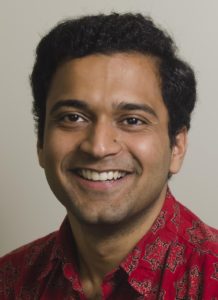Interview with Professor Rajan Udwani

Rajan is an Assistant Professor in the Industrial Engineering and Operations Research department at UC Berkeley. He received my PhD in Operations Research from MIT. Before joining UC berkeley, he was a postdoctoral researcher in the IEOR department at Columbia University. He also received a B.Tech. in Electrical Engineering from IIT Bombay.
Tell us a little bit about your childhood - where did you grow up and how did you become interested in math and engineering?
I grew up in India. Interestingly I was neutral about mathematics as a subject until I was about 15. It was around this age that we had to decide a rough direction for what we wanted to do later on — picking math meant eventually becoming an engineer, choosing biology meant going into medicine. I picked mathematics because it personally seemed like the most challenging thing to do.
Please describe your journey through college. Where did you complete your undergraduate and graduate studies?
I did my undergrad at Indian Institute of Technology Bombay and subsequently did a PhD in Operations Research at MIT. My undergraduate was in EE and it was an interesting transition. At first I was keenly interested in doing a PhD in computer architecture (a conventional EE topic) and towards my last year I discovered algorithm design and optimization which really changed my direction and brought me into operations research.
What was your research focus during the course of your PhD program? Can you tell us a little about your work?
My thesis consisted of new algorithmic results for optimization problems where the uncertainty is modeled through the lens of robust optimization. Robust optimization takes a pessimistic view of uncertainty and outputs solutions that work well in the worst case. The problems I considered had a diverse array of applications ranging from sensor placement to scheduling appointments. More recently I have been working on algorithmic problems that commonly appear in online platforms.
When and how did you decide to enter academia?
I worked for a year in industry before starting my PhD. That made me realize that I truly enjoy thinking hard about a problem over a period of time and really understanding the problem “physics” in a rigorous way. This kind of exploration takes time and patience, which is what led me to pursue a PhD with the goal of finding an academic job from the get go.
Beginning your time as a professor in a remote environment, how has your experience at Berkeley IEOR been? What are some of the best parts and biggest challenges about it?
Hardest has of course been the lack of normal daily conversations with colleagues and students. Normally, I would have looked forward to engaging and slowly getting to know everyone over the first year. But I expect to be able to make up for it once things get back to normal. Overall though, I count myself very lucky to have found this exciting opportunity last year just in time before the pandemic!
What research themes are you currently exploring? Where do you see your research interests going in the next 5-10 years?
More broadly, I am interested in algorithm design and I aspire to develop a deep as well as broad expertise on both the theory and practice of algorithms in the next 10 years.
What is the most exciting thing about the field of IEOR right now?
What I’ve come to understand is that every person who loves their research sees it as exciting and promising. So I, of course, think that problems involving online platforms and marketplaces are very exciting right now!
Would you like to share any advice for current PhD students trying to break into academic roles?
Pursue research that you love and don’t be afraid of getting stuck and failing. Getting stuck is often a part of doing really interesting work. And loving your problem is what gets you across the periods of being stuck.